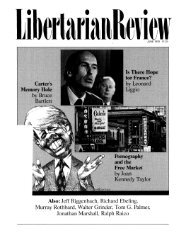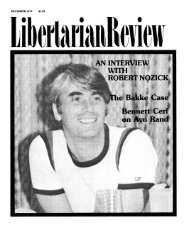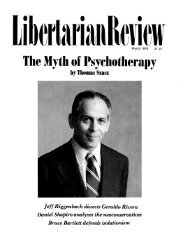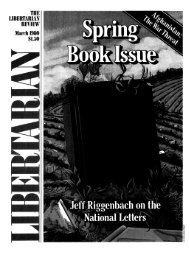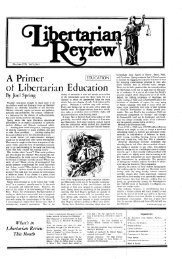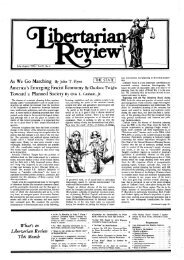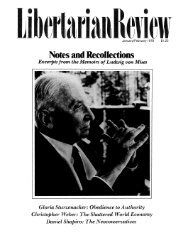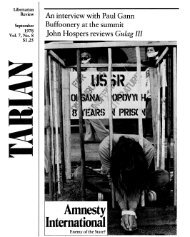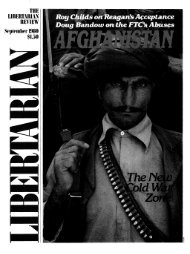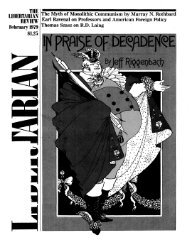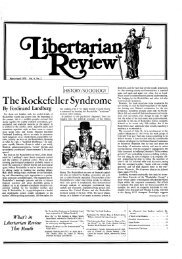The Libertarian Review July 1978 - Libertarianism.org
The Libertarian Review July 1978 - Libertarianism.org
The Libertarian Review July 1978 - Libertarianism.org
Create successful ePaper yourself
Turn your PDF publications into a flip-book with our unique Google optimized e-Paper software.
an innocent citizen is the fear that, if notice were given, he wouldconceal or destroy the object of the search. Probable cause tobelieve that the custodian is a criminal, or that he holds acriminal's weapons, spoils, or the like, justifies that fear, andtherefore such a showing complies with the Clause. But ifnothing said under oath in the warrant application demonstratesthe need for an unannounced search by force, the probable causerequirement is not satisfied.Here, perhaps, the Daily's announced policy of destroyingunused photos that might be incriminating, after theappropriate issue of the paper was published, might havebeen grounds for "probable cause." But this informationwas never even presented to the judge who issued the warrant.Moreover, Palo Alto Police Chief James Zurcher,another defendant, had been informed two days before thesearch of the Daily offices, and only an hour or so after thekey confrontation between demonstrators and police at theStanford Hospital, that the only individual withphotographs of the clash was a Stanford Police photographer,Nick Brunot. (Zurcher had been so informed byBob Beyers, long-time director of the Stanford News Service,who appeared on the scene just as the demonstratorsbroke out from behind barricades that had been erected.)Brunot reports that the Palo Alto police didn't comearound to see his photos until "a week or ten days after theevent."<strong>The</strong> only other possible justification the police might offerfor invading a person's privacy to obtain "mere evidence"is an urgent need for speed in identification of acriminal. If they could afford to wait so long to seeBrunot's photos, that situation clearly· couldn't have applied.Perhaps a more complete view of the police and districtattorney's philosophy in such matters can be obtainedby considering their action in a separate incident two yearslater. In October 1972, Federal District Court Judge RobertPeckham ruled that the Daily search violated the First andFourteenth Amendments, but had refused to grant an injunctionbecause all the defendants were "respected membersof the community" so he expected "that this decisionwould be honored." Just seven months later, investigatorsfor the DA's office, armed with a search warrant, searchedthe patient files at Stanford Hospital's psychiatry clinic.<strong>The</strong>y were looking for the records of a patient who was thevictim of a sexual assault-despite the fact that a subpoenahad been issued to the patient's doctor for those very records,and was still outstanding!One might take these perversions of justice to be isolatedincidents, were it not for the examples presented in theother ten cases of warranted police searches of media officessince the Daily incident. In few of them could thepolice make even a doubtful case that the newspaper orradio station might destroy or hide the evidence in question,and in none of them could they claim the need for instantidentification for fear the suspects would otherwiseescape their grasp.While the implications of the Supreme Court's decisionin Zurcher v. <strong>The</strong> Stanford Daily are frightening for theaverage citizen, they have especially dire overtones for themedia.<strong>The</strong> role of the pressWhen the Branzburg decision first exposed newsmen to thethreat of subpoena, Justice Powell was the key vote;without his support, the decision would have gone theother way. He felt the case was important enough to writea separate concurring opinion, in which he carefullydelineated what he felt was the relationship between FirstAmendment rights and the state's law enforcement needs:<strong>The</strong> Court does not hold that newsmen, subpoenaed to testify beforea grand jury, are without constitutional rights with respectto the gathering of news or in safe-guarding their sources. Certainly,we do not hold, as suggested in the dissenting opinion,that state and federal authorities are free to "annex" the newsmedia as 'an investigative arm of government'. <strong>The</strong> solicituderepeatedly shown by this Court for the First Amendment freedomsshould be sufficient assurance against any such effort....Indeed, if the newsman is called upon to give information bearingonly a remote and tenuous relationship to the subject of theinvestigation, or if he has some other reason to believe that histestimony confidential source relationsryips, without a legitimateneed of law enforcement, he will have access to the Court on amotion to quash and an appropriate protective order may beentered. <strong>The</strong> asserted claim to privilege should be judged on itsfacts by the striking of a proper balance between freedom of thepress and the obligation of all citizens to give relevant testimonywith respect to criminal conduct.Thus, said Mr. Justice Powell, when we grant the powerto subpoena, no blanket exemption is given to the press.But newsmen may contest such subpoenas on the groundsthat their First Amendment rights outweigh government(read "police") needs, through the traditional adversary(read "lawyer vs. lawyer") proceedings before a judgewho,through natural inclination, rates to be more supportiveof the state than of the press. Yet now, in Zurcherv. <strong>The</strong> Stanford Daily, Justice Powell and his colleagueseem to be saying that even this minimal protection for thepress is no longer required.Justice White's majority opinion did direct any courtpresented with a petition for a warrant to "apply the warrantrequirements with particular exactitude when FirstAmendment interests would be endangered by the search."<strong>The</strong> Court felt that no adversary proceeding was necessarybecause "properly administered, the preconditions for awarrant . . . should afford sufficient protection against theharms that are assertedly threatened by warrants forsearching newspaper offices." Wouldn't this place confidentialpress sources in greater jeopardy than the priorBranzburg decision? No, wrote Justice White, forif the requirements of specificity and reasonableness are properlyapplied, policed, and observed, will there be any occasion oropportunity for officers to rummage at large in newspaper filesor to intrude into or to deter normal editorial and publicationdecisions. <strong>The</strong> warrant in this case authorized nothing of thissort. Nor are we convinced, anymore than we were in Branzburg... , that confidential sources will disappear and that the presswill suppress news because of fears of warranted searches.Whatever incremental effect there may be in this regard if searchwarrants, as well as subpoenas, are permissible in proper circumstances,it does not make a constitutional difference in ourjudgement.30<strong>Libertarian</strong> <strong>Review</strong>



